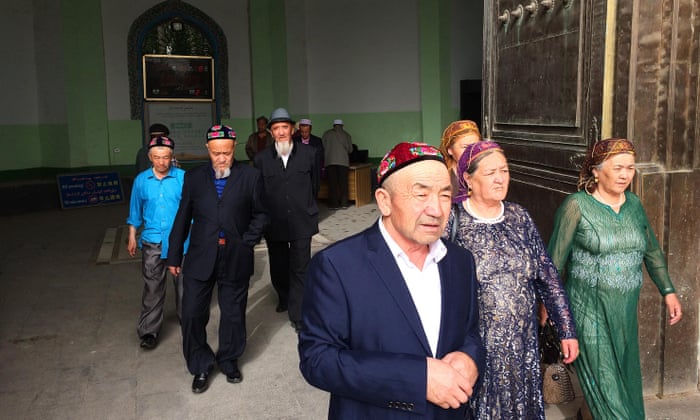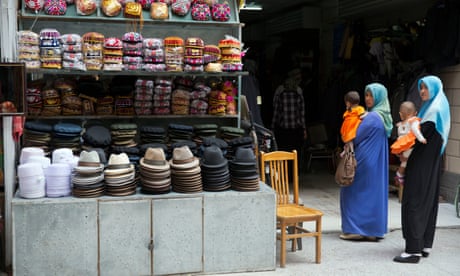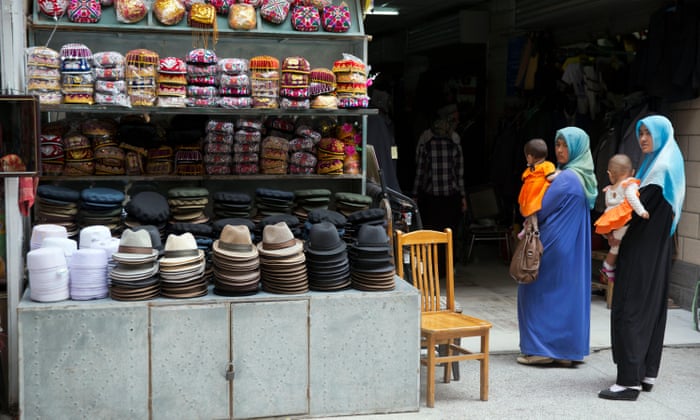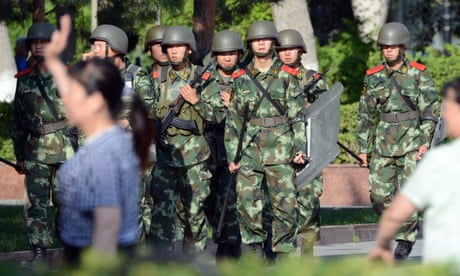By Benjamin Haas in Hong Kong

Worshippers leave Kashgar’s Id Kah mosque in Xinjiang during Ramadan.
Muslim children in China’s far western Xinjiang region are being forced to change their “religious” names and adults are being coerced into attending rallies showing devotion to the officially atheist Communist party.
During Ramadan, the authorities in Xinjiang have ordered all children under 16 to change names where police have determined they are “overly religious”.
During Ramadan, the authorities in Xinjiang have ordered all children under 16 to change names where police have determined they are “overly religious”.
As many as 15 names have been banned, including Islam, Quran, Mecca, Jihad, Imam, Saddam, Hajj, Medina and Arafat.

China bans religious names for Muslims in Xinjiang
In April authorities banned certain names for newborns that were deemed to have religious connotations, but the new order expands forced name changes to anyone under 16, the age at which Chinese citizens are issued a national identity card.
The order coincided with millions gathering at 50,000 individual rallies across Xinjiang this week to pledge allegiance to the Communist party.

China bans religious names for Muslims in Xinjiang
In April authorities banned certain names for newborns that were deemed to have religious connotations, but the new order expands forced name changes to anyone under 16, the age at which Chinese citizens are issued a national identity card.
The order coincided with millions gathering at 50,000 individual rallies across Xinjiang this week to pledge allegiance to the Communist party.
More than a quarter of the region’s population sang the national anthem at 9am on 29 May and pledged allegiance to the Communist party, according to state media reports.
Xinjiang’s Muslims mostly belonging to the Uighur ethnic group, a Turkic people.
Xinjiang’s Muslims mostly belonging to the Uighur ethnic group, a Turkic people.
The region has occasionally seen sporadic violence which China blames on international terrorist groups.
But overseas observers say the vast majority of incidents are a result of local grievances.
“Terrorists are the scum of the Uighur people, they are the common enemies of the people of all ethnic groups,” said a Communist party cadre leading one of the rallies in Urumqi, the capital of Xinjiang.
“Terrorists are the scum of the Uighur people, they are the common enemies of the people of all ethnic groups,” said a Communist party cadre leading one of the rallies in Urumqi, the capital of Xinjiang.
“We must treat the enemy harshly and brush away the old to make a clean sweep, we should raise our swords high and in no way be lenient.”
State media accounts of the mass rallies gave no indication as to a reason for the sudden display of patriotism.
State media accounts of the mass rallies gave no indication as to a reason for the sudden display of patriotism.
Photos of some rallies showed paramilitary troops in full body armour armed with assault rifles attending the ceremony.
“Fundamentally these rallies are just a show of force, and part of the audience is the Han Chinese population in Xinjiang, to show the power of the state,” said Michael Clarke, a political science professor at the Australian National University and expert on Xinjiang.
“Fundamentally these rallies are just a show of force, and part of the audience is the Han Chinese population in Xinjiang, to show the power of the state,” said Michael Clarke, a political science professor at the Australian National University and expert on Xinjiang.
“But in terms of the Uighur population, it’s difficult to see how these kinds of mass rallies will win the hearts and minds over average Uighurs, and will likely do quite the opposite.”
Xinjiang’s capital, Urumqi, is more than 3,000km away from Beijing.
Human rights groups accuse China of restricting Uighurs’ freedom of religion and expression and authorities routinely deny passports to members of the ethnic group.
Xinjiang’s capital, Urumqi, is more than 3,000km away from Beijing.
Human rights groups accuse China of restricting Uighurs’ freedom of religion and expression and authorities routinely deny passports to members of the ethnic group.
The government has also encourages mass migration by Han Chinese to the area and they now make up roughly 45% of the population.
Xinjiang has seen an increasingly invasive security state since Xi Jinping came to power in 2012, Clarke added, including hiring thousands of police.
The region is at the centre of Xi’s Belt and Road initiative, a $900bn development aimed at building closer ties within Asia and beyond by constructing large-scale infrastructure.
In recent months authorities began confiscating Qur’ans published before August 2012, declaring them illegal for containing “extremist content”, according to a report by US-funded Radio Free Asia.
On the same day as the mass rallies, officials in Xinjiang announced they had expelled a Communist party member for attending religious activities at a local mosque.
Xinjiang has seen an increasingly invasive security state since Xi Jinping came to power in 2012, Clarke added, including hiring thousands of police.
The region is at the centre of Xi’s Belt and Road initiative, a $900bn development aimed at building closer ties within Asia and beyond by constructing large-scale infrastructure.
In recent months authorities began confiscating Qur’ans published before August 2012, declaring them illegal for containing “extremist content”, according to a report by US-funded Radio Free Asia.
On the same day as the mass rallies, officials in Xinjiang announced they had expelled a Communist party member for attending religious activities at a local mosque.
It was not clear if the man was a government official or simply a private citizen who was also a party member.
Rules announced last year also forbid retired officials from attending religious ceremonies and ban them from holding beliefs.
Rules announced last year also forbid retired officials from attending religious ceremonies and ban them from holding beliefs.

